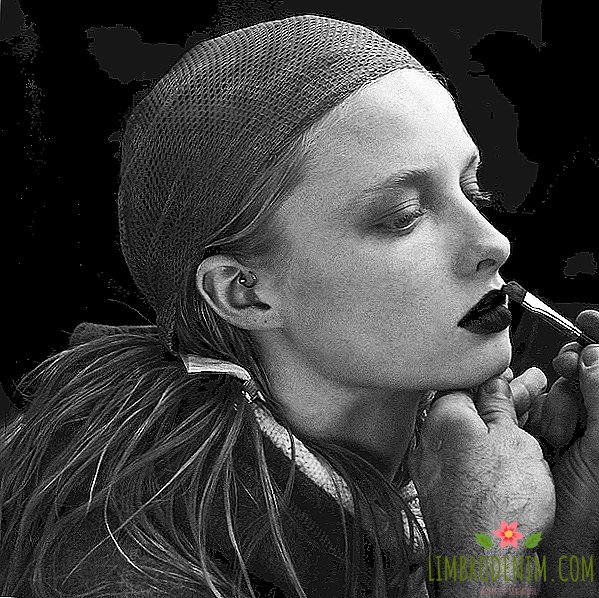Writer Guzel Yakhina about favorite books
IN BACKGROUND "BOOK SHELF" we ask journalists, writers, scholars, curators, and other heroines about their literary preferences and publications, which occupy an important place in their bookcase. Today, writer Guzel Yakhina, author of the novel Zuleikha opens her eyes and winner of the literary prize Yasnaya Polyana, shares her stories about favorite books.

 Probably, choosing a book on the shelf - what to let in, with what author and heroes to spend the next few days - is the first serious choice a person makes in his life. Bookcase, library - these are the places where a child has freedom of choice.
Probably, choosing a book on the shelf - what to let in, with what author and heroes to spend the next few days - is the first serious choice a person makes in his life. Bookcase, library - these are the places where a child has freedom of choice.
Do you know what I miss today, in the era of electronic books and gadgets? Bookcases. They quietly disappeared from our everyday life, along with disc phones, home radio stations, paper newspapers and thick magazines on the mezzanine. Remember how it was even fifteen years ago? You come to a new home for a visit and the first thing is to the bookshelves: what does the owner read? That is - what is it made of? The cabinet was a "friend-foe" marker, and very accurate. Everything was important: a large closet or a small one (the correct closet, of course, must be large, either up to the ceiling or full wall). Opened or closed (in this case there are no glass doors to extend a hand - and pulled out). As there are books in it: in a strict order, neatly sorted by color and size, or "lively", mixed. Are there "old favorite" little books on the shelves, captured and falling apart into pieces, or solid fashionable subscriptions. So I, going to the interview, half of the books from my list could no longer bring - I do not have them in paper form. Our closet is small, mostly there are children's publications for the daughter.
In preparing for the interview, I realized that I could compile a list of my favorite books entirely from fairy tales and legends. My love for mythology and folklore comes from childhood, when I devoured collections of fairy tales and myths in unbelievable quantities and could easily remember the genealogies of the Greek gods. When I went to school, my parents were worried about my addiction to the "frivolous" genre, began to hide fairy tale books from me and slip something more suitable from their point of view. And I still found and read. Perhaps it is thanks to this childish love that the Jungian view is close to me today.
At school I was an exemplary Soviet pioneer: a subscription to the school library, to the district, to the city library. The book is the best gift. The book is the best friend. So it was, really. One kind of children's fear was associated with books: in the bookcase my grandparents had many powerful volumes (collected works — Marx, Engels, Lenin, Chernyshevsky ...), and for some reason I decided that closer to adulthood I will need to read these books without fail, to the one - this is scary.
While studying at the institute at the Faculty of Foreign Languages of the Kazan Pedagogical Institute, all fellow students, including myself, had a separate regiment in bookcases for dictionaries. And there were real treasures! Someone inherited from the diplomatic uncle Langenscheidt, someone "captured" on the flea market Devkin, and someone has a real Duden, a gift from a German pen-pal. With the new dictionaries in the early nineties, it was tight: they were chased, they were farced, they were used as bribes. And when I moved to Moscow, a bag with things was stolen from me - the largest, barely lifting; the thieves did not know that all my dictionaries that I had accumulated during the years of study were in it.
With age, I began to treat more strictly what I let myself in: what books I read, what movies I watch, what people I communicate with. We are responsible for who and what surrounds us. I still read a lot, but now it's mostly non-fiction. To create a historical story, it’s necessary to dive into the material, so my main reading today is a dissertation, memoirs and scientific articles. I understood: you read a hundred books on a topic, and you use one or two to create your own text. But if you do not read the remaining ninety-nine, it will be noticeable in the text.
For fun, now I read a little. There are authors whom I trust unconditionally: Lyudmila Ulitskaya, Evgeny Vodolazkin, Elena Chizhova, - I always wait for their books, I run to buy. I am deeply grateful to the authors, the texts of which unexpectedly turn into a very forgotten, childish pleasure - to forget about everything and plunge into the story with the head. The last such book was for me "The Favorite" Jonathan Littella.

Brothers Grimm
"Tales and Legends"
For me, this collection is not only the favorite book of fairy tales since childhood, but also an example of how vulnerable folklore can be in the face of ideology. In fascist Germany, folk tales were used by the regime for propaganda purposes, they were altered in the most monstrous manner. What is worth only sleeping beauty, white-haired Aryan blonde, which the prince does not wake up with a kiss, but a Nazi "Heil"! In 1945, the tales of Grimm were even banned for a short time in the zones of Western occupation, regarding them as "helpers of the regime."
And recently I came across a book released in 1935 by the Saratov Regional State Publishing House. Grimm’s familiar histories since childhood — about the golden goose, the mischievous devil, the giants, the animals gathered in one hut — were rewritten by the compiler’s unwavering hand and presented from a very definite point of view of what the ideological perspective is like the folklore of the people of Nemrepublica. In two of these tales, even Joseph Stalin appears as a hero, communicating with giants. Here is a "folk" creativity.
"The Way One Way. D. Bergman's Diary 1941-1942"
This book was presented to me recently by Irina Shcherbakova, the program manager of the society "Memorial" (and the book was also published with the assistance of "Memorial" in the publishing house "Individual"). This text is one of the few diaries of Soviet Germans known to us. Most of the Volga Germans were people who were not inclined to keep regular records: peasants, artisans, factory workers. The more valuable is the diary of Dmitry Bergman.
He began it on August 30, 1941 — that is, on the day when he learned about the upcoming deportation of the German population — and led him for a hundred and fourteen days. The camps, the journey in teplushki, life on a settlement in Siberia - everything is told in detail and honestly, with German thoroughness, without a bit of indignation or anger. Hope permeates the entire text - you need to be patient a little more, work a little more, and then it will definitely get better ... The author of the diary died in early 1942.
Clarissa Pinkola Estes
"Running with wolves. Female archetype in myths and legends"
The author, the Jungian psychoanalyst and the researcher of mythology (and concurrently also the director of the Jung Research Center in the United States), wrote an amazing book about the female archetype - based on ideas about the female figure in various cultures.
When I read "Running ..." for the first time, it took, perhaps, to get over a hundred pages, until I got used to the language - unhurried, florid, colored with metaphors. But the next four flew by. And the book firmly stood on the inner "shelf", where the most beloved. Now I can read from any place - from any chapter and any sub-chapter inside. Calming down for the night, instead of milk and honey, so that good dreams should occur.
Vladimir Zheleznikov
Scarecrow
Of course, one of the main books of childhood. Of course, I cried when I read. But among other things, it is also a text that taught a very important thing: you can not swallow the book eagerly for a day or two, breaking tired eyes and hiding from parents somewhere in the bathroom or on the outskirts of the suburban area (as I usually did) and read for weeks and months. I remember the first part of Zheleznikov’s novel published in some pioneer magazine. And then I had to wait - a whole month! - until the next part will be published. And think about the heroes, and fantasize about the plot, look for analogies in your own school class. In general, include the soul and head. The wait was very helpful.
Recently, slipping the "Scarecrow" to my daughter, I opened the book, read a few lines - and immediately shut it. I understood that to re-read now, with adult eyes, is to destroy that children's delight. It is better not to reread any books in order not to kill them in oneself.
Ernest Hemingway
"The Old Man and the Sea"
When I was five years old, our family lived in a small one-room apartment. On the wall of a single room there was a single photograph - an old man with a gray beard and white shirt, with a kind smile on his face. I was sure that this was my great-uncle (otherwise why would he smile so kindly?). Nobody told me this, this knowledge appeared in the head by itself, as well as the assumption that the smiling grandfather had probably already died, since he did not come to visit us. Many years later, I saw the same portrait of "grandfathers" in some magazine with the signature "famous American writer Ernest Hemingway." It was, it seems, after I read the beloved "For whom the bell tolls", "Farewell, weapons!" and "The Old Man and the Sea".
The texts of Hemingway for me - the standard of the author's sense of proportion. "The Old Man and the Sea" was conceived as a big and densely populated novel, where the fate of many residents of the fishing village would be intertwined, and the story of the fisherman Santiago would be just "one of." But in the end, the author cut off all unnecessary, leaving a single plot.
John Truby
"Anatomy of History: 22 Steps to Creating a Successful Script"
I met three years ago with lectures by the world-famous "scenario doctor" and teacher John Truby, while still in film school. He offers his author's approach to constructing plot patterns of various stories (whether it be a movie, a novel, a television series or a play). Very waiting for the Russian edition. Last year, finally waited.
Despite the threatening name of "Anatomy", it seemed to me not as a rigid textbook describing such a mechanistic approach to constructing a story from individual parts, but rather a tool for shaping the scriptwriter (playwright, writer) of an intuitive approach to composing plot patterns. The book also has a subtitle - "22 steps to creating a successful script"; She was published by Alpina non-fiction. From textbooks now fashionable Western scenic gurus - Christopher Vogler, Linda Seger, Blake Snyder - the book Truby seemed to me the most profound. And this is exactly the case when with each reading you find something new in the text.
Andrey Tarkovsky
"Time Taken"
One of the most sincere texts that I read. The arguments of Andrei Tarkovsky about the place of the artist in the world, about the ethics of creativity, about the beauty of the world and art, about the specifics of cinema. The book is written in such a simple and pure language that you just want to quote it.
"The beautiful is hidden from the eyes of those who do not seek the truth, to whom it is contraindicated. This deep lack of spirituality does not perceive, but judges art, its unwillingness and unwillingness to think about the meaning and purpose of its existence in a high sense - very often it is replaced with a vulgarity with a primitive exclamation:" I don’t like it! ”or“ uninteresting! ". With a similar criterion, modern man is not able to think about the truth. This is a strong argument. But he belongs to the blind-born, who is trying to describe a rainbow. He remains simply deaf to that to the pleasure that the artist went through in order to share with others the truth he gained. "
Lyudmila Ulitskaya
"Green Tent"
I read all the books of Ludmila Evgenievna Ulitskaya. And they all stand on my shelf in paper form. I grew up on these books, and I think my daughter will grow on them. At one of the meetings with readers, speaking of the Green Tent, Lyudmila Evgenievna admitted that she “ordered herself to herself” this novel — she decided to write to tell her younger friends about the generation of dissidents through it.
It turned out not only about this, in my opinion. The central metaphor of the novel, imago is about all of us, not only about the late Soviet society, but also about the modern consumer society. Imago is a biological term that refers to one of the stages of insect development. Sometimes the imago, being still an immature individual, turns out to be capable of reproduction - it can produce offspring, but not full-fledged, but the same, as she herself, immature larvae.
Evgeny Vodolazkin
"Aviator"
Yevgeny Vodolazkin speaks Russian so skillfully that reading any of his text is a pleasure. "Laurel" read for two days. "Aviator" was waiting; as soon as she appeared in stores, she ran to buy. And - again read in two days.
A simple fantastic story about a person waking up in "alien" time is just an outline for serious thought: about the relationship between big history and personal experience; about the value of sensory experience in each of us; about the legitimacy of an apology and justification of oneself by the cruelty of time. A novel about the twentieth century with the look of an aviator, "a man who is able to get off the ground" and look at it from a bird's-eye view. Romance - pleasure for the mind.
Aleksey Ivanov
"Heart of Parma"
Alexey Ivanov for me is an example of author's courage. He boldly goes into such different genres (and invariably in each new field turns out to be interesting) that this alone is admirable. That fiction ("Ships and the galaxy", "Earth sorting"). That is a serious social prose ("Dormitory-on-the-Blood", "Geographer Globe Propyl", "Fornication and MUDO"). That is the spirit of exciting historical novels ("Heart of Parma", "Gold of Riot", "Tobol"). Mystic ("Psoglavtsy", "Community"), non-fiction, scripts.
Ivanov's favorite is “The Heart of Parma,” a legendary novel that goes far beyond the ordinary fantasy. The most beautiful history of relations between people of the earth, sorcerers and shamans, ancestral spirits. And - a serious conversation about the conquest of the Urals, the creation of the Russian Empire, the opposition of paganism and Christianity.




